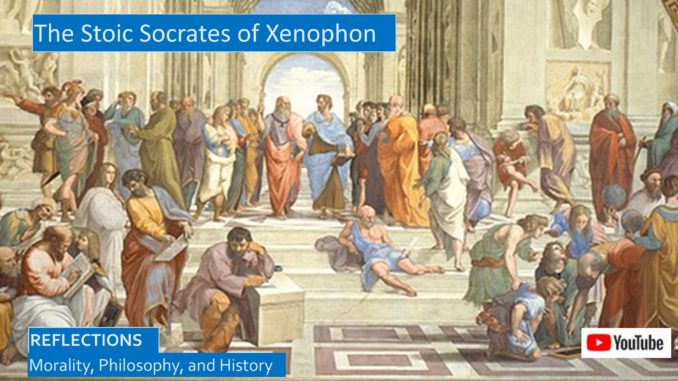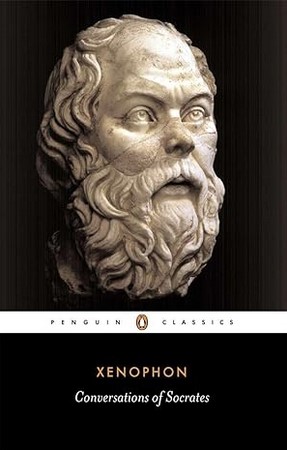
Historians usually dismiss Xenophon’s Socratic dialogues out of hand, and rarely will Xenophon’s Socrates even be mentioned in Greek philosophy courses. There is no doubt that Plato was a far better writer than Xenophon, and that Xenophon composed only a handful of Socratic dialogues compared to the dozens of dialogues Plato and his followers composed.
What is clear is Xenophon’s Socratic dialogues survived intact whereas so many ancient works have disappeared into the sands of history. In fact, St Justin Martyr refers extensively to Xenophon’s Socrates in his apology to the Roman Senate. Since Xenophon’s Socrates is more of a moral philosopher than Plato’s Socrates, you could argue that Xenophon’s Socrates is closer to Stoicism than Plato’s Socrates, which may tell us more about Xenophon and Plato than Socrates.
When we converted our blogs on the trial and execution of Socrates, our thinking evolved, please view a later blog on this topic:
http://www.seekingvirtueandwisdom.com/pondering-the-death-of-socrates-in-xenophon-plato-and-aristophanes/
Please view our YouTube video at: https://youtu.be/Mip1vgRKH1E
Xenophon has a short work on Socrates’ Defense, followed by his Memoirs, which tells us how Socrates led a virtuous life unworthy of his execution. Many readers when reading Plato’s Apology of Socrates are struck by his arrogant manner when he is called upon to speak in his defense in his trial at Athens, but the ever direct Xenophon in the first paragraph mentions “his arrogant tone, which was how Socrates actually spoke.” The translator’s footnote says that the Greek word for arrogance does not have quite the negative connotation that it does in English, that it could “simply imply talking from a high standpoint.” Perhaps it means something like supremely over-confident, or morally superior, or morally condescending, or maybe just plain uppity.
Like in Plato’s Apology, Socrates does not spend much time preparing his defense. When asked why he is not preparing a defense, he responds, “Since I have consistently done no wrong, this is the finest preparation for a defense.”
Plato’s Socrates tells us that he is ready to die because he is morally obligated to follow the laws of the state, whereas Xenophon’s Socrates is more stoic, he accepts the punishment of death because he prefers to die with dignity before dementia sets in, since he is already quite elderly, possibly in his seventies.
Xenophon’s Socrates definitely sounds Stoic, he sought to die the good Stoic death. “Socrates was so arrogant in court that he invited the juror’s ill-will and more or less forced them to condemn him. His fate was proper to one loved by the gods, because he both avoided the most difficult part of life and gained the easiest of deaths. His fortitude was obvious, since he decided death was the better option, he showed no weakness in the face of death, but awaited it cheerfully.”[1]
XENOPHON’S MEMOIRS OF SOCRATES
In his defense of Socrates, Xenophon opens with the charges against him, that “he does not recognize the gods recognized by the State, but introduces new deities, and that Socrates corrupts the youth.”
To answer these charges, Xenophon first points out that Socrates encouraged those who wish to run estates or a country efficiently should seek the advice of diviners, such as the Oracle at Delphi. He reasoned that many things are under men’s control, but there are many events men can never totally predict regardless of their preparation, like the success of a harvest, the digging of a well, success in love and war, and the vagaries of political fortunes. Xenophon thought that those who supposed that such matters were totally dependent on human efforts with no divine intervention were actually superstitious, and it was “also superstitious to consult diviners on questions which the gods enabled us to decide by the use of our wits.” “He said that where the gods have given us power to act using out intelligence we ought to use it, but where the outcome is concealed from humans, we should try to discover it from the gods by divination, for the gods communicate to those whom they favor.”
Since Greek Philosophy paved the way in the hearts of the Greeks for Christianity, what is the take away message for us today? That we should certainly ask for God’s blessings and intervention as we face the difficult decisions and undertakings in our lives, but this should not prevent us from assuming responsibility for the success of our endeavors, and that we should certainly not blame God for any difficulties we may encounter. When the twists and turns of life turn out well, perhaps it was partly due to divine intervention, or perhaps God gave us the confidence to make the right decisions and follow through.
Xenophon’s Socrates was more the Stoic Philosopher, Socrates “always discussed human matters, trying to find out the nature of piety and impiety, honor and dishonor, right and wrong, sanity and lunacy, courage and cowardice, State and statesman”, and all other knowledge that truly good men would seek.
Xenophon’s Socrates belief in the gods comes close to the implicit monotheism of the Stoics. Most Greeks believed that the “gods know some things but not others, but Socrates believed that the gods know everything, both words and actions and unspoken intentions, and that they are present everywhere and communicate to people about all kinds of human affairs.”[2] “Socrates prayed to the gods simply to give him what was good, recognizing that they know best what is good for us.”[3]
Xenophon’s Socrates displayed the Stoic virtues of self-discipline and controlling the passions. “Socrates was the most self-disciplined of men in his sexual and other appetites, he was most tolerant of cold and heat and hardships of all kinds, and he trained himself to be moderate so he needed few possessions.” Socrates preferred to teach the moderate virtues mostly by his own example. “He neither neglected the body nor commended others for doing so.” “He was not ostentatious in his clothing or in his footwear or in the rest of his daily life. He did make his associates money-lovers, the rid them of all other desires except for his company,” he refused to charge fees, “he was surprised that a man who taught goodness would demand a fee for it.”[4]
Xenophon’s Socrates quotes Hesiod’s “Works and Days,” which reminds us of Jesus’ teaching of the wide and narrow path:
“Evil can be easily found, freely;
Smooth is the road, and very near she dwells.
But sweat the gods have set upon the way
To goodness, long and steep is the path to it
And rough at first, but if you reach the summit
Thereafter is it easy, hard though it was.”[5]
The most memorable passages in Xenophon where Hercules meets the ladies Virtue and Vice. The lady Virtue of Xenophon’s Socrates is elegant, with a genuine noble character, whereas the lady Vice is plump with a pretension of nobility, who masquerades herself as a cheaper and less secure virtue. Lady Vice is an Epicurean, she thinks pleasure is the primary virtue of life.
Xenophon’s Socrates has the lady Vice eager to rush ahead of Virtue, running up to Hercules saying, “Hercules, I see that you can’t make up your mind which way of life to adapt. If you take me as your friend, I will lead you by the easiest and most pleasant road; you shall not miss the taste of any pleasure, and you shall live out your life without any experience of hardship.”[6]
Our blog on St Justin the Martyr and Xenophon retells this story in depth.
Then Xenophon’s Socrates has a dialogue with an ungrateful teenager, some things never change, we will encourage you to read the dialogue for yourself, we will provide the concluding lecture: “So if you are sensible, my boy, you will beseech the gods to pardon any disregard that you have shown towards your mother in case they count you as ungrateful and refuse to do you any good; and at the same time you will take care that your fellow men don’t observe you neglecting your parents and lose respect for you so that you stand revealed as destitute of friends; for if they get the notion that you are ungrateful to your parents, nobody will expect gratitude in return for doing you a kindness.”[7]
Xenophon’s Socrates engages two quarrelling brothers, and perhaps in jest the translator suggests, he compares the effort to getting along with your brother with training your horse. Horses respond best to kindness, as do brothers. Although the elder brother should take the lead, Socrates suggests that maybe the younger brother should try breaking the cycle of animosity by showing some common courtesy. The younger brother objects, what if his older brother does not improve?
“In that case,” said Socrates, “you will simply run the risk of showing that you are a good and affectionate brother, and that he is a bad brother who doesn’t deserve to be treated kindly. But I don’t support that anything of the sort will happen. Perhaps when he realizes you are challenging him t o this kind of contest, he will be very keen to outdo you in kindness both spoken and practical.”[8]
[1] Xenophon, Socrates’ Defense, pp. 41-49.
[2] Xenophon, Memoirs of Socrates, In the Xenophon Conversations of Socrates, translated by Hugh Treadnick and Robin Waterfield (New York: Penguin Books, 1990), Section 1.1, pp. 68-72.
[3] Xenophon, Memoirs of Socrates, Section 1.3, p. 86.
[4] Xenophon, Memoirs of Socrates, Section 1.2, pp. 72-73.
[5] Xenophon, Memoirs of Socrates, Section 2.1, p. 105.
[6] Xenophon, “The Memoirs of Socrates,” Book 2, pp. 106-108.
[7] Xenophon, Memoirs of Socrates, Section 2.2, p. 113.
[8] Xenophon, Memoirs of Socrates, Section 2.3, pp. 113-116.





4 Trackbacks / Pingbacks